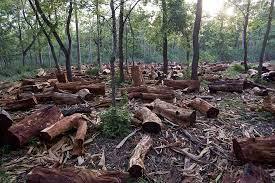A new report says that industrial rubber plantations in West and Central Africa have been linked to an area of tropical deforestation 16 times the size of Brussels since 2000.
This, it is claimed, establishes it as the leading European driver of deforestation in the region – despite being left out of proposed rules to tackle the EU’s role in global deforestation.
“The rubber industry is threatening the land, livelihoods and rights of local communities and destroying a crucial carbon sink”, says the report.
It goes on, “However, rubber is currently excluded from a draft EU law to prevent products linked to deforestation from being sold on the European market following tyre industry lobbying. The law also fails to oblige financial institutions from carrying out due diligence to prevent funding of deforestation, and does not require companies to check on risks that threaten violate human rights.”
“The European Union imports 30% of all rubber shipped by Africa’s top producers, worth 12 times more than its imports of palm oil from the same region. Demand is also growing: the industry grew by a reported 9% in 2021, and is predicted to increase by a third by 2030,” it states.
Global Witness’ investigation used Landsat and Sentinel satellite data to track established rubber concessions across Cameroon, Gabon, Liberia, Nigeria, Côte d’Ivoire and Ghana since 2000. It found the ecosystems impacted by rubber plantations range from old-growth equatorial forests in Cameroon and Gabon, to forest reserves in Ghana and Nigeria.
The report adds, “Almost all the rubber plantations where Global Witness found deforestation has taken place are owned by just three international companies: the Singapore-based firms Olam and Halcyon Agri, and Belgian-owned Socfin, which is listed on the Luxembourg stock exchange. Halycon Agri and Socfin have been suppliers of European tyre giants including Michelin and Continental.
“These firms do not just rely on the EU market to sell their product but are bankrolled by some of Europe’s biggest banks. Between 2016 and 2020, Olam made credit deals worth over $1 billion (€882 million) with Rabobank, and $768 million (€677 million) with BNP Paribas. In 2020, Deutsche Bank supplied a ‘sustainability’ loan worth up to $75 million (€66 million) to Halcyon Agri.
“Nevertheless, the EU’s draft law to protect forests does not oblige European banks not to fund deforestation, nor does it restrict rubber linked to deforestation or forest degradation from being bought and sold on the EU market.
“The law, proposed by the European Commission in 2021 and set to be negotiated and finalised in late 2022, aims to ensure products including palm oil, beef and soy sold on the EU market do not contribute to deforestation around the world,” it says.
The report adds, “A lobby group whose members include Michelin, Continental, Pirelli and Goodyear successfully pushed to exclude rubber from the European Commission’s proposal, arguing that mandatory sustainability standards were “not… feasible for the natural rubber value chain.”
“Forests in West and Central Africa are critical to the fight against the climate emergency, absorbing three times as much carbon dioxide each year as France emits.
“The expansion of agribusiness in the region is also fuelling poverty and insecurity for communities, who are losing access to land on which to farm or hunt. Land conflicts have been reported in Liberia, Cameroon, Nigeria, and Côte d’Ivoire.
“Indigenous groups have been hit particularly hard. In Cameroon, community members told a Global Witness reporter how people from indigenous Baka groups were forced from the land which supported them without warning or rehousing, during the development of a 11,600-hectare rubber plantation.”
Giulia Bondi, Senior EU Forests Campaigner at Global Witness said:“Our research shows that rubber plantations are the biggest threat to tropical forests in West and Central Africa, and European banks and tyre companies are propping up this destructive industry.From Cameroon to Côte d’Ivoire, the EU’s voracious appetite for rubber is devastating indigenous communities and eroding a vital carbon sink, yet astonishingly a draft law to prevent deforestation-linked products from being sold in Europe doesn’t include rubber, fails to oblige banks to stop funding deforestation, and does not uphold indigenous communities’ rights.
Bondi said, “MEPs and national governments need to overrule powerful corporate interests and close these loopholes in the proposed law in order to protect these climate-critical forests and the communities that depend on them.”
Samuel Nguiffo, a forest campaigner and lawyer from Cameroon said: “If you look at the global demand for land in Africa, much of it comes from rubber – and we now know that much of the demand for rubber comes from the European Union. The land that is being used by companies to plant rubber trees is land that is being lost by communities. European lawmakers have the responsibility to safeguard our communities and the forests they protect and depend on.”
Follow EU Today on Social media:




